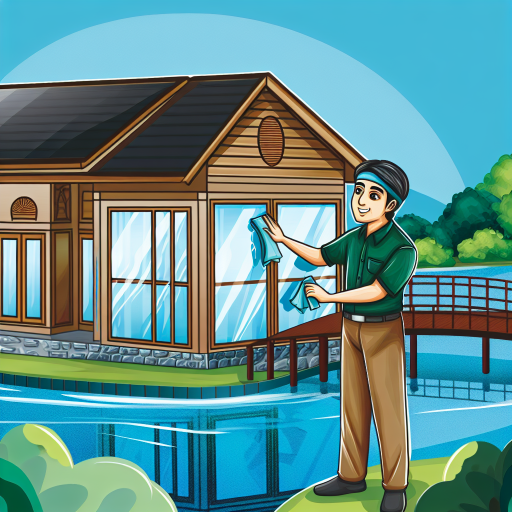Understanding Your Priorities: What Do You Want from a Waterfront Property?
Identifying Your Goals
Begin by identifying your primary goals for the waterfront property.
Consider whether you want it for relaxation, investment, or recreational activities.
Additionally, think about the type of lifestyle you envision.
Assessing Your Budget
Your budget will significantly impact your choices.
Evaluate your finances to determine how much you can spend.
Include additional costs such as maintenance and taxes in your budget.
Location Preferences
Location plays a vital role in choosing a waterfront property.
Decide if you prefer a remote area or a bustling community.
Consider proximity to amenities like shops, restaurants, and schools.
Type of Waterfront
Different types of waterfront properties are available.
Choose between lakefront, riverfront, and oceanfront properties.
Each type offers unique opportunities and challenges.
Consider Future Needs
Think about your long-term goals and potential changes in your lifestyle.
Anticipate family growth, retirement, or even resale value.
Your waterfront property should accommodate these changes effectively.
Understanding Local Regulations
Familiarize yourself with local zoning laws and regulations.
Ensure your intended use of the property complies with these rules.
Research any restrictions concerning land use, building, or development.
Exploring Different Types of Waterfront Properties
Lakeside Properties
Lakeside properties offer tranquility and scenic beauty.
These locations are ideal for fishing, swimming, and kayaking.
Consider access to amenities like boating ramps and picnic areas.
Research local regulations on property use and dock construction.
Also, think about seasonal changes and their impact on lake levels.
Riverfront Homes
Riverfront homes provide a dynamic living environment.
They are perfect for those who enjoy fishing, rafting, or river walks.
Check the water quality and flow rates in the area.
Furthermore, be mindful of potential flooding in certain locations.
Explore local wildlife and conservation efforts along the riverbanks.
Oceanfront Properties
Oceanfront properties are highly sought after for their stunning views.
These homes usually come with beach access and water activities.
Consider the local climate and potential for hurricanes or storms.
Research neighborhood amenities, such as shops and restaurants.
Also, keep in mind the maintenance needs associated with salty air.
Bay and Lagoon Properties
Bay properties offer a unique blend of peaceful waters and stunning sunsets.
They often provide calm waters perfect for boating and paddleboarding.
Evaluate the local marine life and recreational opportunities available.
Look into zoning laws and potential development in the area.
Additionally, consider the impact of tides on property usage.
Water Access Properties
Properties near water access offer flexibility without direct waterfront costs.
These homes are often close to parks or boat launches.
Check the distance to public or shared access points for convenience.
This option is suitable for those seeking lower maintenance levels.
Finally, weigh proximity to amenities against water access options.
Assessing Location: The Importance of Proximity to Amenities and Attractions
Understanding the Significance of Location
Choosing the right waterfront property begins with its location.
The beauty of water views can be easily overshadowed by distance from essential services.
Proximity to amenities greatly enhances your living experience.
Consider your daily needs when evaluating potential homes.
Evaluating Nearby Amenities
What amenities do you consider essential?
Look for grocery stores, hospitals, and schools nearby.
Having these facilities within a short drive can save time and energy.
Additionally, explore local restaurants and entertainment options.
A vibrant community can significantly improve your lifestyle.
Attractions That Enhance Your Experience
Natural attractions can add immense value to your waterfront property.
Proximity to beaches, parks, and hiking trails offers endless recreation opportunities.
Cultural attractions, such as museums or theaters, can enrich your weekends.
Consider the local community events that might interest you.
Transportation Access Matters
Transportation options greatly influence convenience and accessibility.
Access to public transport can ease commutes to work or school.
Check for nearby highways or major roads that facilitate travel.
Being closer to transit hubs often enhances property value.
Balancing Serenity with Accessibility
Finding the perfect balance can be challenging but rewarding.
Many waterfront properties offer tranquil settings away from urban noise.
Consider how far you’re willing to travel for your daily needs.
Your ideal location should provide peace without complete isolation.
Investigating Local Development Plans
Research local development plans for future growth and changes.
New construction can impact property values and the local environment.
Additionally, upcoming amenities can enhance your investment.
Stay informed about what is planned in your area.
See Related Content: Comprehensive Insider Guide To Ski-In/Ski-Out Luxury Properties In The USA
Evaluating Property Conditions
Investigating Flood Zones
Start your search by assessing flood zone maps for the property.
These maps highlight areas prone to flooding.
Understanding risk levels is crucial when buying waterfront property.
Contact local authorities for up-to-date flood zone information.
This approach ensures you make an informed decision.
Consider properties categorized in high-risk flood zones carefully.
Insurance premiums may be significantly higher for these areas.
Evaluate the property’s elevation relative to flood risk.
Higher elevations often mean reduced flood risk.
Additionally, inquire about the flood history of the area.
This history can provide valuable insights into risks.
Assessing Environmental Factors
Examine water quality reports before making a purchase.
Knowing the quality ensures safe recreational use of the water.
You should also check for any local environmental regulations.
These regulations can affect property use and value.
Investigate the area’s wildlife and natural habitats.
Preserved ecosystems may impose restrictions on future development.
Furthermore, be aware of any pollution sources in the vicinity.
Avoid properties near industrial sites or sewage treatment plants.
These locations can negatively impact property enjoyment and value.
Consulting Environmental Experts
Consider hiring an environmental consultant for detailed insights.
They can provide assessments of potential risks to the property.
Consultants often use specialized tools for thorough evaluations.
Additionally, they can help navigate local environmental policies.
This expertise can be invaluable during the buying process.
Local conservation groups may also offer helpful information.
Engaging with these organizations helps you understand environmental impacts.
Ultimately, informed decisions lead to better long-term investments.
Gain More Insights: The Benefits of Investing in Gated Luxury Communities
Budgeting for Your Purchase: Hidden Costs of Waterfront Properties
Understanding the Basic Costs
Waterfront properties often have a higher purchase price.
However, initial costs are just the beginning.
Buyers frequently overlook ongoing costs associated with ownership.
It’s essential to account for these hidden expenses.
Insurance and Risk Assessment
Insurance premiums for waterfront properties can be significant.
Flood insurance may be required depending on the location.
Investigate local regulations regarding insurance requirements.
Consider the potential for higher premiums related to natural disasters.
Maintenance Expenses
Regular maintenance is crucial for waterfront properties.
Waterfront properties often require more upkeep than inland homes.
Consider the costs of dock maintenance and watercraft storage.
Be aware of potential costs for landscaping and pest control.
Additionally, water quality testing can incur regular expenses.
Utilities and Services
Utility costs can differ significantly from standard properties.
Waterfront properties might have unique services, such as boat slips.
Investigate the availability and costs of these additional utilities.
Check for special assessments tied to waterfront services.
Property Taxes and Assessments
Property taxes on waterfront homes can be markedly higher.
Research the local tax rates and potential increases.
Be aware of assessments for community projects or improvements.
Understanding local tax implications is vital for budgeting.
Contingency Planning
Always set aside funds for unexpected expenses.
Natural events can prompt urgent repairs and renovations.
A dedicated reserve can ease the financial burden in emergencies.
Incorporate a contingency fund into your overall budget plan.
Gain More Insights: Understanding Property Taxes On Luxury Waterfront Homes
Researching Local Regulations and Zoning Laws Affecting Waterfront Properties
Understanding Local Zoning Laws
Local zoning laws dictate how properties can be used.
These laws can restrict activities on waterfront properties.
For instance, some areas may prohibit commercial development.
Always check the zoning designation of a property before purchasing.
This helps ensure your intended use aligns with local regulations.
Importance of Building Codes
Building codes set standards for construction and safety.
Waterfront properties often face specific building regulations.
These may include flood-resistant measures and structural integrity requirements.
Researching applicable building codes is crucial for home safety.
Consult with local authorities to understand these codes thoroughly.
Environmental Regulations
Environmental laws protect natural resources and ecosystems.
Waterfront properties may be subject to special regulations.
These regulations typically address issues like wetland preservation.
Additionally, they may involve restrictions on shoreline modifications.
Be informed of any environmental assessments that might be necessary.
Access to Water Bodies
Access rights to lakes, rivers, or oceanfront can vary significantly.
Some areas may have public access while others are private.
Understanding these rights is essential for waterfront enjoyment.
Confirm with local authorities about the access regulations in the area.
Community Associations and Restrictions
Many waterfront properties are part of community associations.
These associations often have their own rules and restrictions.
Membership may entail additional fees but offers benefits.
Review community guidelines to foresee any possible limitations.
This includes dock use, property modifications, and maintenance commitments.
Discover More: The Role of Exclusive Amenities in Defining Luxury Homes

The Role of Real Estate Agents: How to Choose the Right Agent for Waterfront Purchases
Understanding Waterfront Properties
Waterfront properties come in various types and styles.
Being clear about your preferences helps narrow your choices.
Different locations offer distinct benefits and challenges.
Importance of a Real Estate Agent
A knowledgeable real estate agent can simplify your search.
They understand local markets and property values.
Agents can provide valuable insight into waterfront regulations.
Criteria for Choosing the Right Agent
- Look for agents who specialize in waterfront properties.
- Experience in the area enhances their effectiveness.
- Ask about their previous waterfront transactions.
- Check their online reviews and testimonials.
Interviewing Potential Agents
Prepare questions to assess their expertise.
Inquire about their marketing strategies for waterfront listings.
Discuss their knowledge of local zoning laws.
Evaluate how they plan to handle negotiations.
Building a Trusting Relationship
A successful partnership requires open communication.
Ensure the agent understands your goals and budget.
Establish a comfortable rapport during your interactions.
Utilizing a Network of Professionals
Good agents often have a network of service providers.
They can recommend inspectors, appraisers, and contractors.
These connections can save you time and effort during the process.
Final Steps in Choosing Your Agent
Trust your instincts when making a final decision.
Select someone who communicates effectively and listens well.
Your agent should share your enthusiasm for finding the perfect waterfront property.
Considering Investment Potential
Evaluating Financial Risks
Investing in waterfront property involves significant financial risks.
Market fluctuations can greatly affect property values.
Additionally, natural disasters can lead to damage or loss.
It is crucial to assess the specific location’s vulnerability.
Research the historical property value trends in the area.
Estimating Future Appreciation
Understanding future appreciation potential is essential.
Look for areas with planned infrastructure developments.
Proximity to parks, schools, and services enhances value.
Waterfront properties often attract premium buyers over time.
Consider demographic trends that might influence demand.
Rental Income Considerations
Rental potential can provide a steady income stream.
Examine the local rental market for similar properties.
Consider seasonal demand fluctuations for vacation rentals.
Evaluate short-term versus long-term rental strategies.
Check local regulations regarding rentals to avoid issues.
Tax Implications and Incentives
Rental properties may provide tax benefits to investors.
Research property tax rates in the desired area.
Some locations offer tax incentives for vacation rentals.
Consult a real estate professional for advice.
Understand the impact of property taxes on overall investment returns.
Inspecting the Property: Essential Features to Look For Before Buying
Understanding Location
Location is crucial when selecting a waterfront property.
Consider how the location affects your lifestyle and daily activities.
Examine the proximity to amenities, schools, and hospitals.
Additionally, assess the local community and its characteristics.
Evaluate access to recreational activities available in the area.
Evaluating the Waterfront
The quality of the waterfront is vital for your enjoyment.
Look for clean water, ensuring it is suitable for swimming and boating.
Observe the shoreline and its stability throughout the seasons.
Identify any natural hazards that may exist in the vicinity.
Consider the views and privacy available from the property.
Inspecting the Property Structure
The property’s structural integrity should be your priority.
Check for any visible signs of wear or damage.
Inspect the foundation and overall stability of the property.
Look for quality materials used in construction and maintenance.
Evaluate the condition of roofs, windows, and doors as well.
Understanding Zoning and Regulations
Be aware of local zoning laws and regulations.
Restrictions may limit modifications or expansions on the property.
Check for any environmental protections regarding the waterfront.
Additionally, look into property taxes and insurance requirements.
Assessing Additional Features
Consider the value of additional features on the property.
Look for a dock or boathouse if you enjoy water activities.
Evaluate outdoor living spaces such as decks and patios.
Determine if any landscaping adds aesthetic or functional value.
Additionally, inspect for adequate parking and access points.
Understanding Property Maintenance
Ongoing Responsibilities of Waterfront Ownership
Owning waterfront property involves unique maintenance tasks.
Property owners need to ensure the shoreline is protected.
Regular erosion control is crucial in preventing land loss.
Monitoring water quality helps to maintain a healthy ecosystem.
Consider hiring professionals for landscaping and care.
Routine checks on docks and boat lifts prevent costly repairs.
Invest in a good water filtration system if your water supply is impacted.
Seasonal maintenance tasks can include winterization and spring clean-up.
Understand local regulations regarding waterfront modifications.
Participating in community clean-up events fosters environmental stewardship.
Financial Aspects of Maintenance
Caring for waterfront properties often comes with ongoing costs.
Property owners should budget for maintenance services and repairs.
Insurance premiums can be higher due to the risk of flooding.
Consider establishing a reserve fund for unexpected expenses.
Consult with real estate experts for advice on financial planning.
Environmental Considerations
Maintenance must align with environmental guidelines.
Preserving natural habitats protects local wildlife.
Utilize native plants in landscaping to reduce water usage.
Implement sustainable practices to minimize your ecological footprint.
Regularly assess the impact of property activities on the environment.
Follow best practices for waste disposal and recycling.




